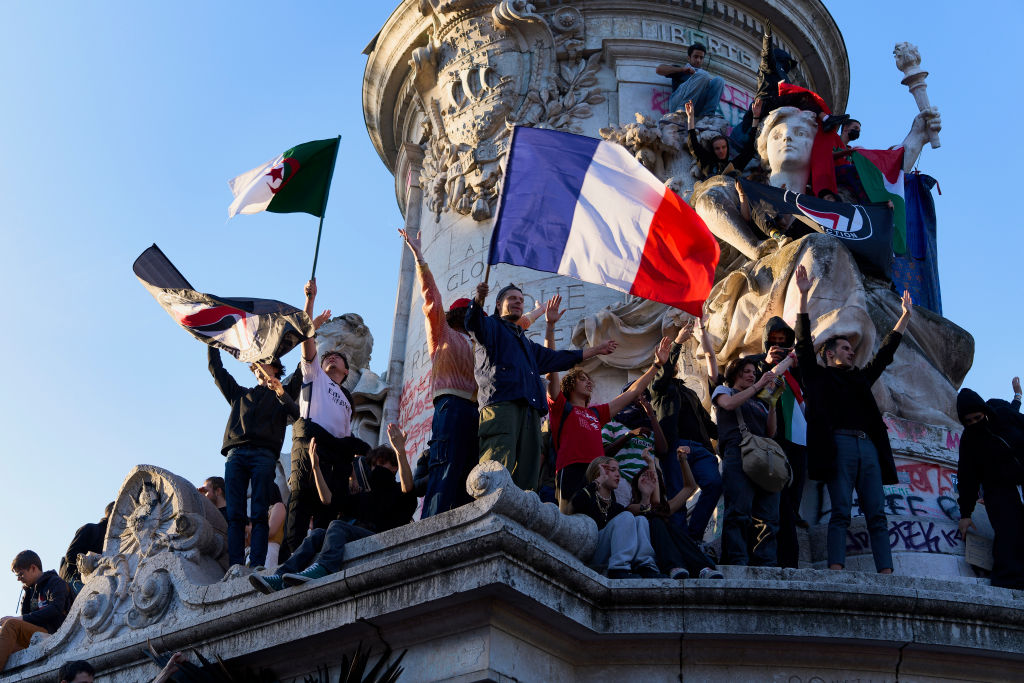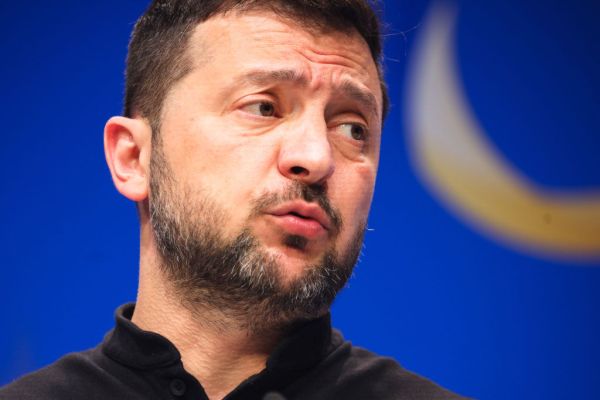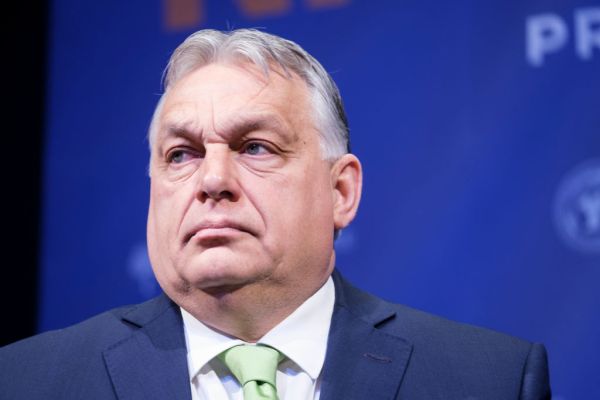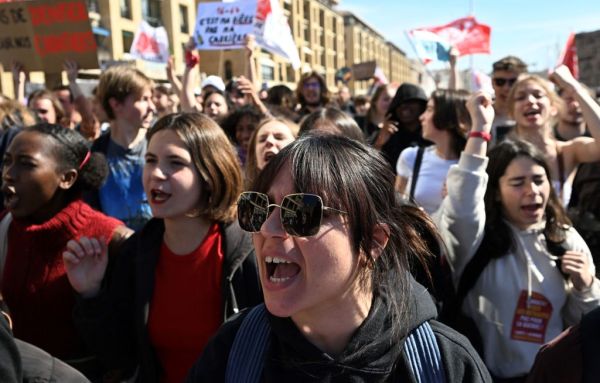Happy Tuesday! Late last month, an Excalibur-like sword went missing from a rock wall in the village of Rocamadour, France, in which it had apparently been lodged for some 1,300 years.
Might we suggest checking for it at the Naval Observatory?
Quick Hits: Today’s Top Stories
- President Joe Biden sent a letter to Democratic lawmakers on Monday morning reaffirming his intention to continue his reelection bid. “I want you to know that despite all the speculation in the press and elsewhere, I am firmly committed to staying in this race, to running this race to the end, and to beating Donald Trump,” the president wrote in his letter. “The voters of the Democratic Party have voted. They have chosen me to be the nominee of the party. Do we now just say this process didn’t matter? That the voters don’t have a say?” Following the letter’s release, Democratic Rep. Steven Horsford of Nevada, the chair of the Congressional Black Caucus, reaffirmed his support for Biden in a tweet, even as Rep. Adam Smith, a Democrat of Washington state and ranking member of the House Armed Services Committee, called on Biden to step aside on Monday afternoon. “The president’s performance in the debate was alarming to watch and the American people have made it clear they no longer see him as a credible candidate to serve four more years as president,” Smith said, becoming the sixth member of Congress to publicly call for Biden to withdraw from the presidential race. House Minority Leader Hakeem Jeffries told reporters on Monday that he “support[s] President Joe Biden” and that his “position has not changed.”
- As part of a large-scale missile assault across Ukraine on Monday, Russian forces struck Okhmatdyt Children’s Hospital in Kyiv—the country’s largest. At least 33 people were killed in the barrage—which also struck a maternity clinic elsewhere in Kyiv and an industrial complex in Kryviy Rih—and more than 100 others were injured. The Ukrainian military said it successfully shot down 30 of the 38 missiles launched by Russia. “[The Russian Kh-101 missile that hit the hospital] contains dozens of microelectronics produced in NATO countries,” Ukrainian President Volodymyr Zelensky’s chief of staff Andriy Yermak tweeted. “We must stop this and bring it up at the NATO summit. The attack on children must be one of the key topics.”
- Hamas on Monday threatened to sink ongoing ceasefire talks as the Israel Defense Forces (IDF) continued its military operation in Gaza City. The IDF issued evacuation orders for central Gaza City after it said Israeli intelligence services uncovered information that placed Hamas and Islamic Jihad militants in the area. Hamas’ top political leader, Ismail Haniyeh, warned of “catastrophic consequences” if the military operation continued, while a statement from Hamas claimed that Netanyahu and the Israeli army would bear “full responsibility” for the collapse. Meanwhile, protesters in Israel organized a “Day of Disturbance” on Sunday morning to agitate for the return of hostages in Gaza.
- The Republican Party’s platform committee voted 84 to 18 on Monday to adopt an updated party platform that was heavily influenced by Donald Trump and the Trump campaign, and is set to be finalized at the Republican National Convention in Milwaukee next week. As Dispatch Politics reported yesterday, Trump himself called into the committee meeting on Monday and urged delegates to vote yes on the platform, which notably softens the party’s language on abortion restrictions. “We believe that the 14th Amendment to the Constitution of the United States guarantees that no person can be denied Life or Liberty without Due Process, and that the States are, therefore, free to pass Laws protecting those Rights,” the platform reads. “After 51 years, because of us, that power has been given to the States and to a vote of the People. We will oppose Late Term Abortion, while supporting mothers and policies that advance Prenatal Care, access to Birth Control, and IVF (fertility treatments).” In 2016, the party’s platform included calls for a federal law that would ban abortion after 20 weeks and the adoption of a human life amendment to the Constitution.
- Tropical storm Beryl made landfall in southeast Texas as a Category 1 hurricane on Monday morning, killing at least three people and knocking out power for 2.7 million homes. The storm brought dangerous storm surges and flooding to the greater Houston area, as well as wind speeds of at least 39 miles per hour that destroyed buildings and infrastructure Monday morning. Beryl is expected to continue to weaken as it moves across the Midwest later this week.
- Boeing pleaded guilty on Monday to a criminal felony charge for conspiring to defraud the federal government related to allegations the aeronautics company had failed to implement sufficient safety procedures following two fatal commercial airline crashes both involving Boeing-designed and manufactured 737 jets—one in Indonesian waters in 2018, and another in a small Ethiopian town in 2019. Boeing had originally agreed in 2021—as part of a deferred prosecution deal—to update safety programs following the two deadly crashes, an agreement prosecutors now say the company violated. The company will pay penalties amounting to nearly $500 million, as well as invest $455 million over the next three years to reinforce its safety and compliance procedures. The company will be placed on probation over that period and monitored by an independent third party.
Left-Wing Bloc Becomes Largest in French Parliament

There must be something in the waters of the English Channel that makes French and British leaders take insane electoral gambles at the drop of a hat.
As we wrote to you yesterday, former United Kingdom Prime Minister Rishi Sunak’s snap election dice roll didn’t turn out well for his Conservatives. And despite the positive headlines, it’s possible French President Emmanuel Macron stumbled into the same trap.
After the right-wing populist National Rally (NR) party cleaned up in European parliamentary elections at the beginning of June, Macron decided to call voters’ collective bluff. He dissolved parliament—shocking even some of his close allies—and set elections for the last day of the month, with the second round taking place this past Sunday. The centrist technocrat promised the elections would be a “clarification” for the country on the question of whether it really wanted Marine Le Pen’s right-wing party in charge.
Though weeks of polls—and, indeed, the first round of voting on June 30—seemed to suggest that the French people’s answer to that question was, “yes, actually,” a stunning result in the second round of elections on Sunday saw the NR stumble, ultimately falling behind the New Popular Front, a coalition of previously divided left-wing parties, and Macron’s Together alliance.
Macron’s game of electoral roulette succeeded at keeping the far right out of power—but his attempt at clarification may have only confused France’s contentious politics further. Though Prime Minister Gabriel Attal will lead a caretaker government for the foreseeable future, no party now has enough seats in the French National Assembly to form a new government. Moreover, there’s no clear path forward for a cobbled-together coalition of strange bedfellows.
NR was formerly the National Front, founded by Le Pen’s father, Jean-Marie Le Pen, in 1972. The younger Le Pen has done much to distance herself and her party from the National Front’s reputation for racism and antisemitism under her father—including expelling him in 2015—but it is still a nationalist and anti-immigration endeavor, even as the party adopts more left-wing economic populism and embraces an expanded social safety net.
Though the European right generally underperformed in June’s European parliamentary election, in France, it was an NR sweep—ironic for a party that until recently wasn’t even sure the EU should exist, never mind whether France should be a member. Macron’s party, Renaissance, garnered only some 15 percent of the vote. NR—led by up-and-comer Jordan Bardella, Marine Le Pen’s protégé—doubled that vote share and sent some 30 members to the European Parliament in Brussels, by far the largest delegation of any French party.
It was an embarrassing loss for Macron, a staunch Europeanist whose disapproval rating has hovered around 70 percent for a year after he muscled through sweeping pension reforms. So, with his own party ruling in a precarious minority government that’s hamstrung his legislative agenda, Macron spun the wheel and called an election on June 9. “This is a serious and weighty decision,” Macron said. “Above all, it is an act of trust. Trust in you, my dear compatriots, in the capacity of the French people to make the just choice for themselves and for future generations.”
While he may have been hoping against hope that his own party could regain an absolute majority to get out of minority government purgatory, it seems more likely he wanted to call an election that would have to happen eventually—given his government’s unpopularity—on his own terms.
Plus, a French national parliamentary election functions differently from the European equivalent. While seats in an EU parliamentary election are awarded based on the share of the popular vote, the bar for an individual candidate’s victory in French legislative elections is higher. If a single candidate doesn’t clinch an absolute majority in the first round of legislative elections, there’s a run-off, which could see both the top two vote-getters plus a small handful of candidates who get over a certain vote threshold face voters again.
Macron may have suspected that the system would favor moderate parties and candidates as it has in the past—including with his own elections in 2017 and 2022, which saw many voters hold their noses and vote against Le Pen in the second rounds of those presidential elections. Indeed, there’s a strong tradition of tactical voting in France, which has long maintained a so-called cordon sanitaire—a blockade against right-wing parties with links to France’s collaborationist history. “The rise of nationalists—of demagogues—is a danger for our nation, but also for our Europe, for the place of France in Europe, and in the world,” Macron said upon announcing elections.
In gamesmanship perhaps not unsurprising for a president who once said his thoughts were “too complex” for journalists, Macron seemed to have rationalized even a far-right success, if the system didn’t provide the expected fail-safe: If Le Pen’s party was swept into government, that victory might be a pyrrhic one if the public had time to become dissatisfied with their yet-untested policies before the 2027 presidential election. “And that was not totally far-fetched,” Dalibor Roháč, a senior fellow at the American Enterprise Institute researching European politics, told TMD. “I mean, it was in a way a very brave break with the cordon sanitaire. I think actually in a structured way you sort of let [the far right] in, you turn them into stakeholders in the system, and then it will make it more difficult for them to compete next time around in 2027.”
Indeed, after the first round of voting on June 30, NR seemed poised for a victory, claiming about 30 percent of the popular vote—as in the European elections. At the outset of the campaign, the fractious French left formed a coalition anchored by far-left politician Jean-Luc Mélenchon’s France Unbowed party, plus the Greens and the center-left Socialist party. The grouping—the New Popular Front—put up a respectable 28 percent in the first round. Macron’s bloc of centrist parties, Together, was running in third with some 21 percent of the popular vote.
More than 500 of the 577 seats in the National Assembly were set for a run-off, and in the week between the first and second rounds, Macron’s centrist bloc and the left-wing grouping strategically withdrew more than 200 candidates who seemed likely to splinter the anti-right-wing vote. Even still, polling suggested NR would still come out on top on Sunday with the largest number of seats in parliament.
Not so. In a stunning and unexpected result in Sunday’s second round, the New Popular Front will now form the largest bloc in the National Assembly with 188 seats, though still well short of a majority. Macron’s centrist alliance came away with 161 seats—down about 75 seats from the current parliament. And NR, which fell short of the decisive victory it seemed poised for, will have 142 seats in the national assembly—a jump of about 50 compared to the last legislative election.
The result sent shockwaves through the French political world, and straight through NR’s planned victory party. “Despite a second-round campaign that’s been marked by unnatural political alliances, intended to prevent by all means the French people from choosing a different political way for themselves, the National Rally has today achieved the greatest breakthrough in its entire history,” Bardella said at the NR watch party, taking aim at the left and centers’ strategic withdrawal from races.
Mélenchon—the controversial leader of the most radical party in the left-wing grouping—admitted his surprise at the victory, but quickly recovered himself to demand the president select his coalition to lead the government. “The president has the power, the president has the duty to call on the New Popular Front to govern,” he said Sunday. “It is ready for it.”
By tradition, the president does give the biggest party a chance to form a government, though that may not happen yet. Prime Minister Gabriel Attal, of Macron’s party, offered the president his resignation on Monday, but Macron asked him to remain on in a caretaker capacity in the name of stability. “Our country is facing an unprecedented political situation and is preparing to welcome the world in a few weeks,” Attal said Sunday, referring to the Paris Olympics, set to kick off later this month, and under a pall of concerns over terrorism.
Negotiations to form a new government will be complicated, especially considering modern France has never seen a hung parliament before. Mélenchon—who would likely emerge as the far left’s pick for prime minister despite his reputation as a firebrand—has already declared himself unwilling to form any sort of coalition government with Macron’s grouping so that the left-wing parties can implement their “entire program,” which would undo many of Macron’s key reforms—including the hard-fought revised retirement age.
Many in the centrist grouping have also long considered France Unbowed and Mélenchon—who is anti-Israel and has been accused of antisemitism—too extreme to govern with.“If [Macron] now tries to govern with the far left, they’ll be sort of hanging from his neck like a giant albatross,” Roháč told TMD.
Despite all of the early jockeying, a coalition between some elements of the left and center blocs is almost unavoidable, even if it’s led by someone low-profile and inoffensive—or even a technocrat from outside government altogether.
The confusion and instability underscore how the election which Macron likely hoped might shore up his mandate for three more years only further compromised it—even if his gambit did manage to best the far right for now. “If there is still the commitment on the left and the center to just keep the far right away at all costs,” Roháč said, “then come 2027 the far right will be the only grouping in the country that will be able to point to this dysfunction and say, ‘We are the only alternative. Vote for us.’”
Worth Your Time
- Keir Starmer, the United Kingdom’s new prime minister, has already made arguably the most significant decision of his young premiership: providing orders to the commanders of the country’s four nuclear-armed submarines. “Starmer will be given a pen and four pieces of paper” upon taking office, Brian Klaas wrote for The Atlantic. “On each paper, he must handwrite identical top-secret orders that—hopefully—no other human being will ever see. … Each handwritten letter is placed inside a safe, which is housed inside another safe, on board the nuclear-armed submarine. … If the submarine captain has reason to believe that London has been destroyed in a nuclear blast (one of the cues is said to be that the BBC has stopped broadcasting), then the captain is to make every attempt to verify that the British government no longer exists. Once satisfied that the worst has indeed taken place, only then may the captain open the two safes, unseal the letters, read their contents, and execute the order from the now-deceased prime minister. Should the United Kingdom release its nuclear arsenal and retaliate—or not?”
- In belated Independence Day reflections, Jesse Singal offers praise for the incredible place that is the United States—in all its imperfections. “So the United States is a lot of things: it’s a big, beautiful, free-as-hell place, it is beset by political dysfunction while being pretty stable, it seems to lift a lot of people out of poverty, and its formerly strict racial caste system is rapidly on its way to a welcome and overdue destruction,” he wrote for his Singal-Minded Substack. “It is a historically unusual example of people coming from everywhere in the world to join a diverse but unified whole. It is awesome and beautiful that someone can scrape and claw to get here, not speak the language, and then a few years later their kid is a bilingual American, full stop, who views this place as home, and who is, thanks to the wisdom of our Founders, just as American as any of his neighbors. It’s important to acknowledge this to fend off certain naysayers and would-be revolutionaries who, if they got their way, would choose destruction over reform. It’s also important not to get too starry-eyed, to slide into weird forms of hyper-nationalism or jingoism deaf to the many ways life here still is unfair, and to the ways we could do much better.”
Presented Without Comment
White House press secretary Karine Jean-Pierre, July 8, 2024: “This week, President Biden will speak to national labor leaders of AFL-CIO, host the NATO summit to show the unprecedented strength of our alliance, hold a press conference—a ‘Big Boy Press Conference,’ according to Justin Sink from Bloomberg.”
White House spokesman John Kirby, July 8, 2024: “After that, the president will hold a press conference—I guess a ‘Big Boy Press Conference,’ is what we’re calling it?”
Also Presented Without Comment
Mediaite: Kanye West’s Ex is Speaking at the RNC Next Week
In the Zeitgeist
The trailer for the latest Hollywood racecar movie dropped over the weekend. The film stars Brad Pitt in a role that sounds a little familiar—but we’re not mad about it: We can’t replace Moneyball, but maybe we can recreate it in the aggregate.
Toeing the Company Line
- In the newsletters: Kevin explained (🔒) the real problem with free trade, the Dispatch Politics team checked in on the ongoing meltdown in the Democratic Party, and Nick argued that Joe Biden has gone full MAGA.
- On the podcasts: Sarah and David are joined by Kannon Shanmugam and his summer associates on today’s episode of Advisory Opinions to look back on this SCOTUS term and discuss “text, history, and tradition,” and Steve is joined by The Bulwark’s Tim Miller for a special interview edition of The Dispatch Podcast to discuss the political fallout of Biden’s disastrous debate performance and revisit an earlier conversation about The Dispatch and The Bulwark’s differing approaches to the election.
- On the site today: Charlotte explores how world leaders view Biden as the NATO summit kicks off, Arthur Herman offers a better way to ensure all NATO members are contributing to the military alliance, and Kevin reports from the National Conservatism Conference on the former acting Immigration and Customs Enforcement (ICE) director pitching himself for a comeback.
Let Us Know
Do you think Macron’s maneuvers will weaken the French far right in the long term?








Please note that we at The Dispatch hold ourselves, our work, and our commenters to a higher standard than other places on the internet. We welcome comments that foster genuine debate or discussion—including comments critical of us or our work—but responses that include ad hominem attacks on fellow Dispatch members or are intended to stoke fear and anger may be moderated.
With your membership, you only have the ability to comment on The Morning Dispatch articles. Consider upgrading to join the conversation everywhere.